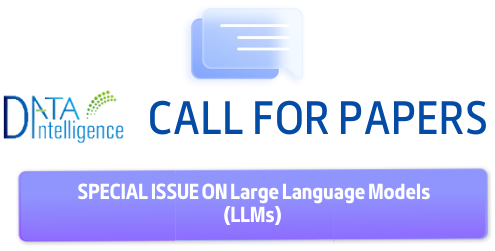ChatGPT横空出世,GPT-4重磅登场。大语言模型 (LLMs) 对自然语言处理 (NLP)的研究和应用产生了前所未有的影响,在众多智能化产业和实践中扮演着愈加重要的角色。为此,Data Intelligence期刊组织 “大语言模型LLMs” 专刊,旨在探讨 LLMs 的最新研究进展。
本次征文主题围绕LLMs,包括但不限于:
LLMs的理论研究及其应用
LLMs的评测和基准测试
LLMs训练和推理技术
LLMs的可解释性
LLMs架构和调优技术
多模态知识图谱与LLMs增强
LLMs在医疗、金融、教育、娱乐等各个领域的应用
LLMs与其他AI技术(如计算机视觉和语音识别)的集成
LLMs在数据智能和知识发现上的最新应用
LLMs的伦理和社会影响
论文类型包括但不限于研究类、技术类、应用类、数据类,专刊也欢迎综述和前瞻思考以及评论类论文。
欢迎社会各界人士踊跃投稿,共同推动LLMs的发展。
稿件提交截止日期:2023 年 5 月 30 日
录用通知:2023年8月30日
最终稿提交截止日期:2023 年 10 月 30 日
发表:稿件被接受后立即在线发表
想了解更多,请联系刘凤红博士 [email protected]
「关于 Data Intelligence」
Data Intelligence 是中国科学院文献情报中心、中国图书进出口(集团)有限公司联合主办,由美国麻省理工学院出版社合作出版的全英文学术期刊。创刊于2019年,目前被EI、ESCI、Scopus、DOAJ、Inspec数据库收录。期刊以知识表示、处理与应用(本体、元数据及其标准、语义标注体系、知识图谱等)及结构化、语义化的数据论文、语义数据驱动的智能算法、系统、平台为刊发主体,致力于推动数据融合、数据与数据处理平台的有效共享。由国际科学数据委员会主席BarendMons,牛津大学Sir Nigel Richard Shadbolt教授、伦斯勒理工学院DeborahL. McGuinness和香港科技大学杨强院士担任学术顾问,由伦斯勒理工学院Jim Hendler教授、中科院文献情报中心张智雄研究馆员、德州大学奥斯汀分校丁颖教授以及东南大学漆桂林教授联袂担任主编。
现将稿件要求和DI相关信息介绍如下:

INTRODUCTION
Data Intelligence is pleased to announce a special issue on LLMs. Large Language Models (LLMs) have revolutionized Natural Language Processing (NLP) and have become an important building block for various applications such as machine translation, text classification, question answering, and text generation. Among the most widely used LLMs, ChatGPT is one of the most popular conversational models that have demonstrated impressive performance in generating human-like responses in various applications, including customer service, language learning, and chatbots.
This call for papers invites submissions on the latest research in LLMs and ChatGPT. It aims to explore the capabilities and potential of LLMs, as well as its challenges, limitations, and ethical implications. We welcome submissions of original research, review articles, and case studies that cover, but are not limited to, the following topics:
 Evaluation and benchmarking of LLMs
Evaluation and benchmarking of LLMs
 Optimization techniques for LLM training and inference
Optimization techniques for LLM training and inference
 Evaluation methods for LLMs
Evaluation methods for LLMs
 Interpreting and explaining LLMs
Interpreting and explaining LLMs
 Architectures and optimization techniques for LLMs
Architectures and optimization techniques for LLMs
 Augmented LLMs (i.e., reasoning, tools, act)
Augmented LLMs (i.e., reasoning, tools, act)
 Applications of LLMs in various fields such as healthcare, finance, education, and entertainment
Applications of LLMs in various fields such as healthcare, finance, education, and entertainment
 Integration of LLMs with other AI technologies such as computer vision and speech recognition
Integration of LLMs with other AI technologies such as computer vision and speech recognition
 Novel uses of LLMs for data intelligence and knowledge discovery
Novel uses of LLMs for data intelligence and knowledge discovery
 Ethical and social implications of LLMs
Ethical and social implications of LLMs
Submission Guidelines
Manuscripts should be original, unpublished work, and not under consideration for publication elsewhere (publications published as preprint are acceptable). All manuscripts will undergo a rigorous peer-review process. The manuscript should be prepared according to the journal's guidelines, which can be found on the Data Intelligence website.
Important Dates
Manuscript submission deadline:May 30, 2023
Acceptance notification: August 30, 2023
Final manuscript due: October 30, 2023
Publication: Immediately published online once upon the manuscript is accepted
Guest Editors
Prof. Dr. Haofen Wang
Tongji University, China;
E-mail: [email protected]

Prof.Dr. Haofen Wang has long served as Chief Technology Officer in a firstline artificial intelligence company and has rich experience in AI R&D management. He is one of the founders of OpenKG, the world's largest Chinese open knowledge graph alliance. He is responsible for participating in a number of national and ministerial AI-related projects, and has published more than 120 high-level papers in the AI field, which have been cited more than 2,900 times and the H-Index has reached 26. He built the world's first interactive virtual idol—”Amber-Xuyan”; the intelligent customer service robot he built has served more than 1 billion users. Currently, he is the Deputy Director of the Terminology Committee of China Computer Society, the Deputy Secretary General of the Language and Knowledge Computing Committee of Chinese Information Society and research professor in College of Design Innovation, Tongji University.
Dr. Jie Bao
Memect, China;
E-mail: [email protected]

Dr. Bao Jie, co-founder of Memect. Dr. Bao received his Ph.D degree from Iowa State University and then worked as a postdoctoral fellow at Rensselaer Polytechnic Institute (RPI) and a visiting researcher at the Distributed Information Group (DIG) of MIT. He then worked as a researcher at Samsung US R&D Center. He was a member of the W3C OWL (Web Ontology Language) working group and participated in the writing of the OWL 2 standard. He now serves as the chair of the Financial KG working group of Language and Knowledge Computing SIG of Chinese Information Processing Society of China (CIPS), member of the W3C Advisory Committee, co-founder of the Chinese Open Knowledge Graph Alliance (OpenKG), and member of the Editorial Board of Data Intelligence.
Prof. Dr. Huaping Zhang
Beijing Institute of Technology, China
E-mail: [email protected]

Dr. Kevin (or Hua-Ping) Zhang is Ph.D supervisor from Beijing Institute of Technology (BIT), and work as the director of NLPIR Lab. of Big Data Search and Mining in BIT. He is chief secretary of Board of Intelligence MulitiLingual Information Processing (IMLIP), affiliated with Chinese Association for Artificial Intelligence (CAAI); and Distinguished member of China Computer Federation (CCF). His research interests include Big Data search and mining, natural language process especially with Chinese language processing. As the team leader, he has been granted over 30 research projects by National Science Foundation of China, China Fundamental Research Plan, and Defense Technology Foundation. Dr. Zhang has published 5 books, over 100 papers. He developed Chinese lexical analysis system NLPIR/ICTCLAS, which was the most cited work in Chinese natural language processing domain (over 20,000 citations). He was awarded with the first prize of Qian Wei-Chang Chinese Information Science and Technology Award (top award in Chinese NLP field) in 2010, the Second Prize of Science and Technology Award from Xinjiang Government for Progress in Science and Technology in 2016, First Prize of Science and Technology Award from Xinjiang Government for Progress in Science and Technology in 2021 (the 2nd position), and the Second Prize of National Defense Science and Technology Award in 2022.
Managing Editor
Dr. Fenghong Liu
Data Intelligence, Chinese Academy of Sciences, China
E-mail: [email protected]
SUBMISSION PROCEDURE
Authors interested in this special issue should submit their work to the journal’s manuscript tracking system at https://mc03.manuscriptcentral.com/di. Please do not forget to indicate in your cover letter that you are submitting to the "Special Issue on LLMs ".
For further inquiries, please contact the managing editor Dr. Fenghong Liu at [email protected]
About Data Intelligence
Data Intelligence, cosponsored by the National Science Library, the Chinese Academy of Sciences, and the China National Publications Import and Export (Group) Corporation, is an open-access, metadata-centric journal intended for data creators, curators, stewards, policymakers, and domain scientists as well as communities interested in sharing data. DI informs industry leaders, researchers, and scientists engaged in sharing and reusing data, metadata, knowledge bases, and data visualization tools. In addition to traditional articles addressing methodologies and/or resources, the journal also publishes “data articles” in the form of knowledge graphs, ontologies, and linked datasets. The Co-Editors-in-Chief of the journal is: Prof. Dr. Jim Hendler, Prof. Dr. Zhixiong Zhang, Prof. Dr. Ying Ding, and Prof. Dr. Guilin Qi. The Executive EIC is Prof. Dr. Yan Zhao.
Data Intelligence is indexed by ESCI\EI. Its recent Citescore is 5.3, ranking top 11% (27/247) of the Library and Information category, 27% (200/747) of Computer Science-Computer Science Applications category, 27% (95/353) of Computer Science-Information Systems category, and 34% of Computer Science-Artificial Intelligence category. Up to March, 2023, the journal has received 788 times of citations according to Web of Sciences with average 4.8 times per item.The estimated IF (impact factor) of 2022 is 3.63.
WEBSITE

https://direct.mit.edu/dint
DI 微信公众号

OpenKG
OpenKG(中文开放知识图谱)旨在推动以中文为核心的知识图谱数据的开放、互联及众包,并促进知识图谱算法、工具及平台的开源开放。

点击阅读原文,进入 OpenKG 网站。